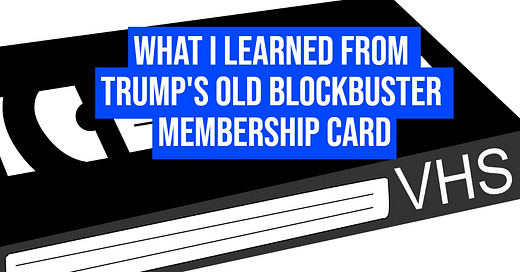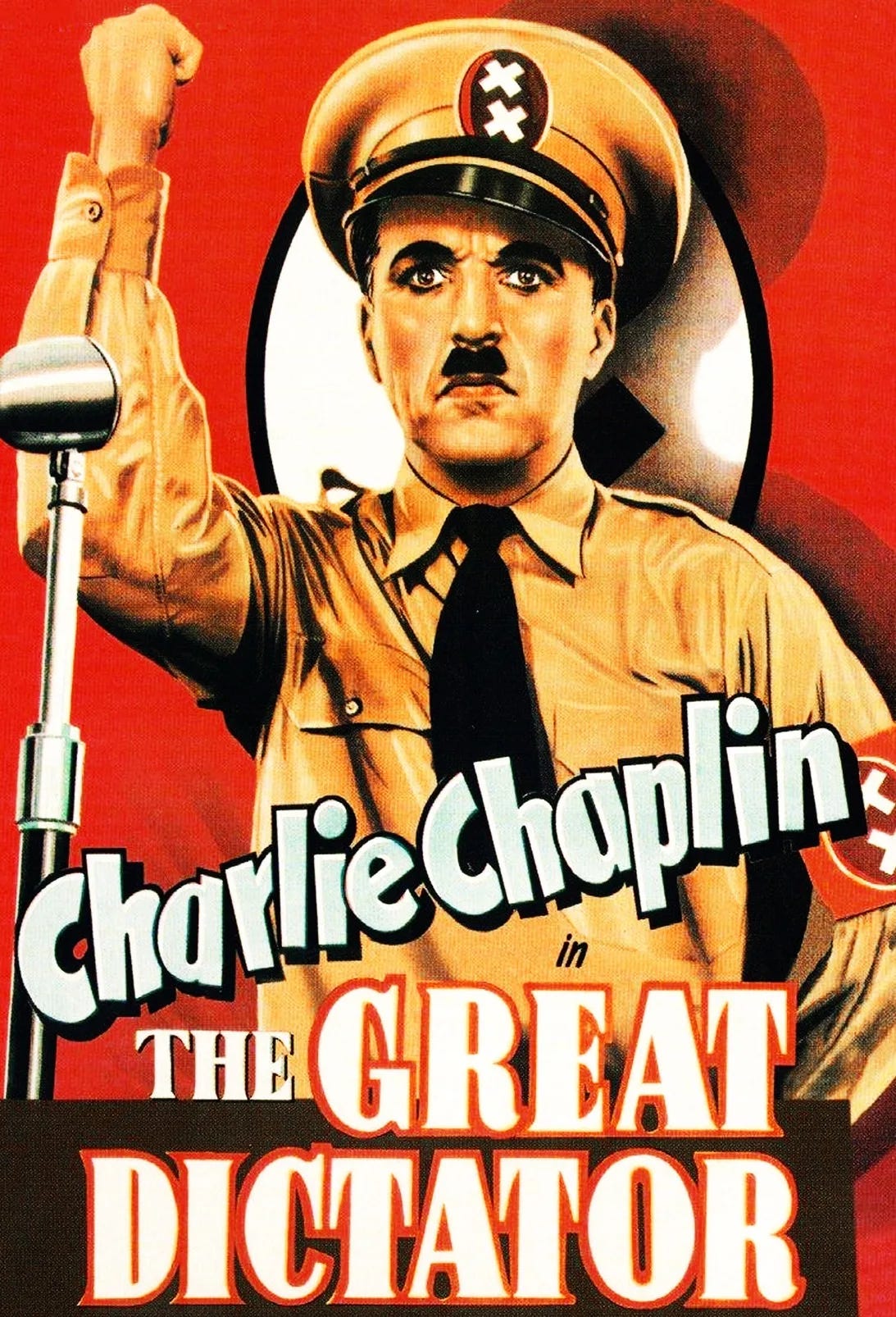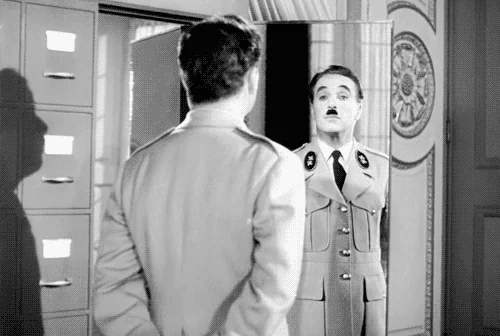[Part 2] Be Kind, Rewind and Then Misrule: How VHS Rentals Educated Trump
Lights, Camera, Foreign Policy: Trump's International Adventures through films
"Welcome to Part [2] of series 'Be Kind, Rewind and Then Misrule: How VHS Rentals Shaped the Trump Presidency'. Here, we dissect how a self-proclaimed 'very stable genius' seems to have mistaken Hollywood schlock for Harvard lectures. Grab your popcorn as we fast-forward through four years of an administration that treated governing like a poorly-scripted straight-to-video sequel, proving that you can learn everything about running a country from your local video store. Who would have fecking known."
[Part 1 of this series is found here]
Freedonia First: When Reality Trumps Satire
Movies: Duck Soup (1933) & The Great Dictator (1940)
Adenoid Hynkel (Actor, Charlie Chaplin). "Democracy shtunk! Liberty shtunk! Fredom shtunk!" - Adenoid Hynkel
Character: Donald J. Trump (Actor, Donald J. Trump). Quote: ""I think NATO is obsolete. It was designed for a different time."
In a geopolitical farce that would make both the Marx Brothers and Charlie Chaplin hang up their greasepaint in despair, Trump's presidency seemed to draw inspiration from both "Duck Soup" and "The Great Dictator" – if these satirical masterpieces had been reimagined as a foreign policy handbook rather than scathing indictments of political absurdity and totalitarianism.

Much like Rufus T. Firefly's bumbling governance of Freedonia and Adenoid Hynkel's bombastic rule of Tomainia, Trump's approach to international diplomacy appeared to be a four-year improv routine where the laugh track was replaced by nervous chuckles from world leaders, at the UN, leaving many to wonder if we were all unwitting extras in a global production where the line between statesmanship and slapstick had been erased faster than you can say "covfefe."
Picture, if you will, Trump at a NATO summit, not unlike Firefly insulting the Sylvanian ambassador, while simultaneously channeling Hynkel's grandiose posturing before his military advisors. Instead of "To war! To war! To war we're gonna go!" or "Aut Caesar aut nullus," (Latin: ‘Either a Caesar or a nobody.’) we got "fire and fury" and "America First."
One could almost hear the collective gasps of diplomats worldwide, their exasperation echoing the frustration of Margaret Dumont and Chaplin's Jewish Barber trying to maintain dignity in a world gone mad.
The films' brilliant skewering of political pomposity and warmongering found their Trumpian equivalent in an administration that seemed to operate on the principle that international diplomacy was best conducted via caps-lock tweets and that global alliances were as disposable as Firefly's cabinet members.
As if fusing Firefly's penchant for insults with Hynkel's delusions of grandeur, Trump appeared to view foreign policy as a reality show where ratings trumped reason, and long-standing allies were just contestants waiting to be fired. Who needs careful negotiation when you can have a photoshoot with a belligerent dictator?
As Trump's vaudevillian approach to statecraft unfolded, the parallels to both films became increasingly surreal. The absurdity of Freedonia's war with Sylvania and Hynkel's globe-trotting antics were replaced by the real-world spectacle of trade wars with allies and love letters to autocrats.
Instead of a comical dance with an inflatable globe, we watched as Trump seemed determined to pop the delicate balloon of international cooperation with a golf club.
One could almost imagine Trump, like Firefly inspecting his troops or Hynkel practicing his speeches, rehearsing handshake power moves in front of a mirror while aides desperately tried to explain the basics of geopolitics using colorful flash cards.
In the movies' most iconic scenes, we see how quickly political rhetoric can escalate to outright conflict, and how the ego of a leader can drive a nation to the brink of disaster. In our reality TV version, we witnessed as carefully crafted international agreements were torn up on a whim and long-standing alliances were treated with all the reverence of a game show consolation prize, leaving us to wonder if "The Art of the Deal" had been ghost-written by Harpo Marx.

Contemplative crowd, as the credits roll on our cinematic comparisons, let's not forget that the director's cut of global diplomacy in real life requires more than just snappy one-liners and photo ops.
As this Marxian-Chaplinesque approach to foreign relations continues to play out on the world stage, one can't help but wonder: If this is our generation's amalgamation of "Duck Soup" and "The Great Dictator," have we all been cast as mute Harpos in a global pantomime where the stakes are decidedly unfunny?
In a world where the President can mistake Twitter for the Situation Room and treat NATO like a protection racket, are we all just one misinterpreted joke away from seeing the carefully constructed architecture of post-war cooperation crumble like a house of cards?
In a geopolitical farce that would make Charlie Chaplin trade his bowler hat for a MAGA cap, Trump's "America First" foreign policy seemed to draw inspiration from "The Great Dictator" – if Chaplin's masterpiece had been reimagined as a playbook for international relations rather than a biting satire of authoritarianism.
And more importantly, when the final custard pie of this administration's diplomatic efforts hits its target, will we find ourselves longing for the relative sophistication of Firefly's "This means war!" or even Hynkel's gibberish speeches?
The true punchline isn't in the witty retort or the slapstick fumble – it's in the realization that on the world stage, words and actions have consequences that outlast any administration, no matter how farcical it may seem.
In the grand tragicomedy of international relations, perhaps it's time we all asked ourselves: Are we content to be a passive audience to this diplomatic duck soup, or do we dare to demand a script that includes more substance and less slapstick?
After all, as Groucho might say, or indeed Donald J Trump might: "These are my principles. If you don't like them, I have others."
In the case of American foreign policy, let's hope we can find some principles we'd actually like to keep – before the laugh track of history drowns out the serious business of global cooperation.
[Part 1 of this series is found here]
Thanks for reading! Hope this article gave you a chuckle or two.
Enjoyed the content? There are a few ways you can show your appreciation:
1. Free Subscriber: You're awesome! All content remains free for you. Forever.
2. Supporter: Your choice to support empowers writers and fuels creativity.
3. Founding Member: You're a champion of our mission, ensuring writers thrive.
Can't commit to a subscription? No worries! You can still...
Remember, every contribution, while optional, is invaluable. You're not just funding content, you're nurturing a community of fellow 'That's Fecking Nuts' enthusiasts! Have a nice fecking day ;-)











So glad I popped another bowl of popcorn! This one had me glued to the screen and before I knew it my bowl was gone. LOVE the Marx Brothers! Perfect parallels. Looking forward to Part 3!
Brilliant.